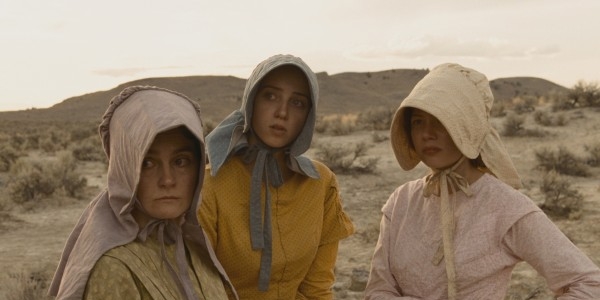The result is the superior Meek’s Cutoff, one of the best films to have reached Australian screens so far this year, which orients its audience with a group of women (Michelle Williams, Shirley Henderson and Zoey Kazan) traversing the sun-parched Oregon desert circa 1845. Along with their husbands (Will Patton, Neal Huff and Paul Dano), they’re lost and in dire need of water, thanks to their putative guide – a puffed up cowboy named Meek (Bruce Greenwood), whose logorrheic nature makes it impossible to discern any truth from the copious oxshit he spouts, day in, day out, from sunrise to sunset. “Is he ignorant, or just plain evil?” Williams’ hardy frontierswoman wonders at one point. No clear answer ever really comes.
“I think for both of us there were real political interests in the genre,” Raymond explains of what prompted he and Reichardt to tackle a western in the first place. “It’s such a cornerstone of American identity – it was exciting to test that out from a different angle and see what happened. It was exciting to talk back to that history in some way.”
Aside from privileging a female perspective—which itself would have made Meek’s Cutoff intriguing enough—the film quite openly functions as an allegory for modern America’s shift between the Bush and Obama administrations. But its focus is more macroscopic too: the introduction of a captive Nez Perce man (Rod Rondeaux) who remains un-subtitled throughout, along with the company’s fraught dependence on their natural surrounds, nudges the metaphor onto the geopolitical stage. But don’t expect sheer didactic transparency of the film.
“The concept of this did rise out of the end of Bush era moment,” says Raymond. “[But] I don’t think either of us are interested in doing ‘issue-based’ political work. What’s fun about this story is that it is such an issue of survival and of group decision making and paranoia – very human scale problems. I could really put aside the political stuff once the plot issues were hashed out and just allow the politics to be this very wide frame for what, hopefully, is pressing human drama between people.”
To imbue the film with the desired air of authenticity and naturalism, both Raymond and Reichardt studied journals kept by pioneer women who made the same passage through the Oregon Trail as the characters do in the film. “The records are always pretty mundane,” explains Raymond. “There’s not a lot in them besides just the day to day drudgery and the sense of what incredible pain thresholds all those people had.”
This sense of endurance and banal routine is strikingly captured by Reichardt, who exhibits a healthy curiosity for period procedure throughout Meek’s Cutoff. Raymond admits the depiction of labour is itself labourious work for a writer and is perhaps best left to filmmakers. “I think [the depiction of] work in fiction is a really important thing. [But] it would have taken so much research for me to write it properly as a story. Whereas Kelly could just turn a camera on it – all in a day’s work.”
But back to that political allegory. Raymond, who is a novelist and author of short fiction as well as scriptwriter, never worries that a politically charged subtext will stamp a work with a limited shelf life. “Sadly, I think the idea of people being led by someone who might not know where they’re going will not be topical for only a particular time. It’s a perennial issue. So that’s the sad hope: that something like this is always going to be relevant in some way.”

